|
|
|
Sort Order |
|
|
|
Items / Page
|
|
|
|
|
|
|
| Srl | Item |
| 1 |
ID:
160849
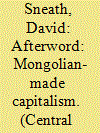

|
|
|
|
|
| Summary/Abstract |
Oligarchy (oligarhi) has become a well-worn Mongolian term for describing the social order. Real power and wealth is now said to be monopolized by a small number of super-elite families. The roots of this oligarchic capitalism lie in the process by which ownership was acquired and concentrated so as to take control of companies, rather than simply making profitable investments. The emergent form resembles Thomas Piketty's notion of ‘patrimonial capitalism’, a political economy dominated by inherited private capital, rather than the wealth created by entrepreneurship or innovation. Mongolian capitalism can also be seen as patrimonial in another sense. Its roots lie in the opportunistic struggle over a form of national patrimony: the enterprises and resources inherited from the previous political economy. The new proprietorial class already appears faintly dynastic, and presently there seem to be no barriers to the transmission of wealth to the next generation of super-rich.
|
|
|
|
|
|
|
|
|
|
|
|
|
|
|
|
| 2 |
ID:
160840
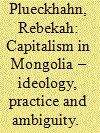

|
|
|
|
|
| Summary/Abstract |
Definitions of and understandings of capitalism are currently the source of much debate in Mongolia’s recent context of severe economic decline. This has followed the differing and sometimes contradictory perceptions of capitalism that have emerged throughout both Mongolia’s recent capitalist history and experiences of socialism. Following an anthropological, generative approach to the making of capitalist economy and drawing from Çalişkan and Callon’s discussion of economization, we explore how the economization of everyday life in Mongolia since 1990 has given rise to a context in which the economy is intensely politicized. This special issue explores the kinds of new economic practices, social formations, ideologies and subjectivities that Mongolia’s capitalist economic forms have produced. We ask what Mongolian processes of economization can tell us about the formation of capitalist economies more generally.
|
|
|
|
|
|
|
|
|
|
|
|
|
|
|
|
| 3 |
ID:
160844
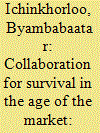

|
|
|
|
|
| Summary/Abstract |
Since 1990, Mongolia has experienced postsocialist transformation and the government-imposed ‘free market economy’. With the collapse of socialism and the former economic order, ordinary people in Mongolia have survived by engaging in diverse economic practices. The aim of this article is to give careful analysis of how people employed everyday economic practices around three key commodities – cashmere, scrap metal, and marmot pelts – to sustain their livelihoods in this postsocialist environment. Based on ethnographic field research, this article argues that social networks and kinship relations persisted through the socio-economic changes and radical reforms of the postsocialist period, creating the foundations for the diverse economic practices found in contemporary Mongolia. These practices served to distribute wealth equally and to sustain livelihoods after the government’s ‘failed’ privatization in the 1990s.
|
|
|
|
|
|
|
|
|
|
|
|
|
|
|
|
| 4 |
ID:
160848


|
|
|
|
|
| Summary/Abstract |
In the run-up to parliamentary elections in Mongolia, it is not uncommon for aspiring political candidates to distribute things like noodles, calendars and cash to citizens. Although the practice is prohibited, it continues to thrive under different guises. This article examines electoral gifting in Uvs, Mongolia, before the 2016 parliamentary election. Drawing on ethnography, it suggests that gifts provide citizens a tool to evaluate candidates while also affording candidates the opportunity to make aspects of themselves known publicly, often through the giving of items that express their economic acumen and business success. It reveals entanglements between politics and the economy, whereby the electioneering landscape is skewed in favour of individuals who can demonstrate that they are either a ‘big person’ who embodies access to wealth, or someone who has the ability to ‘do things’ to generate wealth. Instead of seeing gifting through the prism of democratic ideals, the article argues that the practice operates within culturally specific responsibilities and obligations.
|
|
|
|
|
|
|
|
|
|
|
|
|
|
|
|
| 5 |
ID:
160845


|
|
|
|
|
| Summary/Abstract |
Considering that debt has become a pervasive feature of contemporary life in Mongolia, this article calls for a nuanced examination of the diversity of current debt relations as evinced through its multiple moral interpretations and social effects. Through case studies of moneylenders in contemporary Dornod Province, I discuss (1) how local actors perceive multiple moralities and types of debt (e.g. formal and informal/kinship); (2) how moneylenders comprise an occupational role as ‘translators’ between these different registers; and thus (3) how they allow local debtor actors to navigate their debt load by moving money between the varying registers. By mobilizing local forms of social value, moneylenders create financial value that supports and enables bank debt. As a result, the moralities and logics of finance have increasingly pervaded aspects of local social relations in the collateralization of social standing and the designation of interest payment as a form of community assistance.
|
|
|
|
|
|
|
|
|
|
|
|
|
|
|
|
| 6 |
ID:
160842


|
|
|
|
|
| Summary/Abstract |
Mongolians not only perform capitalist activity in everyday life but also form their own capitalist philosophies and concepts. Since the mid-1990s, Mongolian intellectuals, including professors, translators and columnists, have translated dozens of procapitalist books from English and Russian into Mongolian. Some have established NGOs, student clubs, and foundations to promote capitalism by organizing lectures, as well as summer schools for the public. This article explores how these processes contribute to the understanding of capitalism and Mongolia’s current socio-economic situation. It ethnographically demonstrates the persistence of evolutionist thinking in the making of capitalism and development in Mongolia. It explores how procapitalist intellectuals tried to find ways to outgrow a perceived period of zerleg kapitalizm (wild capitalism) to reach jinhene kapitalizm (genuine capitalism). It examines the implications of these intellectual frameworks, exploring how the outgrowing of these perceived ‘developmental stages’ is often considered to be a ‘solution’ for Mongolia’s development.
|
|
|
|
|
|
|
|
|
|
|
|
|
|
|
|
| 7 |
ID:
160841
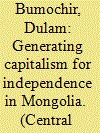

|
|
|
|
|
| Summary/Abstract |
Following Laura Bear et al.’s discussion of ‘generating capitalism’, this article presents an account of two historical periods in which certain Mongolian rulers made the deliberate decision to embrace Euro-American capitalism. They explain that this was done to help Mongolia entice ‘third neighbours’ whose interests secure Mongolia’s independence by preventing Mongolia from being occupied by China or Russia. This paper then recounts how, during each of these historical periods, the nation-state’s rulers prioritized the declaration and consolidation of de facto constitutive political independence. Building on this prioritization of the political, this paper argues that the generation of capitalism in Mongolia is not for the sake of the economy itself, as Bear et al. suggest, but for the sake of independence. Reflecting on this, this article shows how global capitalism can be seen not as a threat to the nation-state but as a help to balance dependences.
|
|
|
|
|
|
|
|
|
|
|
|
|
|
|
|
| 8 |
ID:
160847
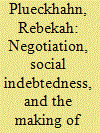

|
|
|
|
|
| Summary/Abstract |
This article explores the types of actions that are dramatically shaping the formation of the peri-urban economic landscape of the ger areas in Ulaanbaatar, Mongolia. Drawing from numerous interviews and ethnographic fieldwork in and around a bus stop on the northern edge of the city, we trace the experience of two different women who each carve out a life and livelihood on this urban fringe. Examining the types of strategies they employ to secure land and employment, we argue that negotiations, speculation and enactions of relationships are vastly influential in shaping Ulaanbaatar’s urban economy from the ground up. Drawing from the anthropology of generative capitalism and the fungibility and heterogeneous nature of money, we discuss how the making of capitalist urban economies in Ulaanbaatar implicates a variety of decisions and materials, perceptions of the state, and local economies of exchange and reciprocity. Central to the shaping of these urban economies, we argue, are emerging moral quandaries and ethics arising out of these entanglements.
|
|
|
|
|
|
|
|
|
|
|
|
|
|
|
|
| 9 |
ID:
160846
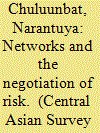

|
|
|
|
|
| Summary/Abstract |
This article identifies relationships that dominate small and medium businesses in Mongolia. Unlike other parts of Asia, these relationships are not necessarily hierarchical, nor are they purely market-driven. Rather, they are characterized by groups of people who sustain each other’s businesses and the social relations that hold them in place. In identifying such relations, we extend questions raised in the ‘economy of favours’ literature. If favours granted between known individuals are not simply about economic transactions, we ask, then what does this say about the kind of capitalist economy prevalent in Mongolia? Not simply an outcome of external forms of financialization, nor a remnant of the socialist planned economy, these relations open up the possibility for a range of ways of doing business in a climate that does not guarantee economic and social security in the sense that we may be familiar with. Attending to the way business deals and people are made and remade within networks and groups, capitalism is opened up to an economic diversity that shapes it from within.
|
|
|
|
|
|
|
|
|
|
|
|
|
|
|
|
|
|
|
|
|